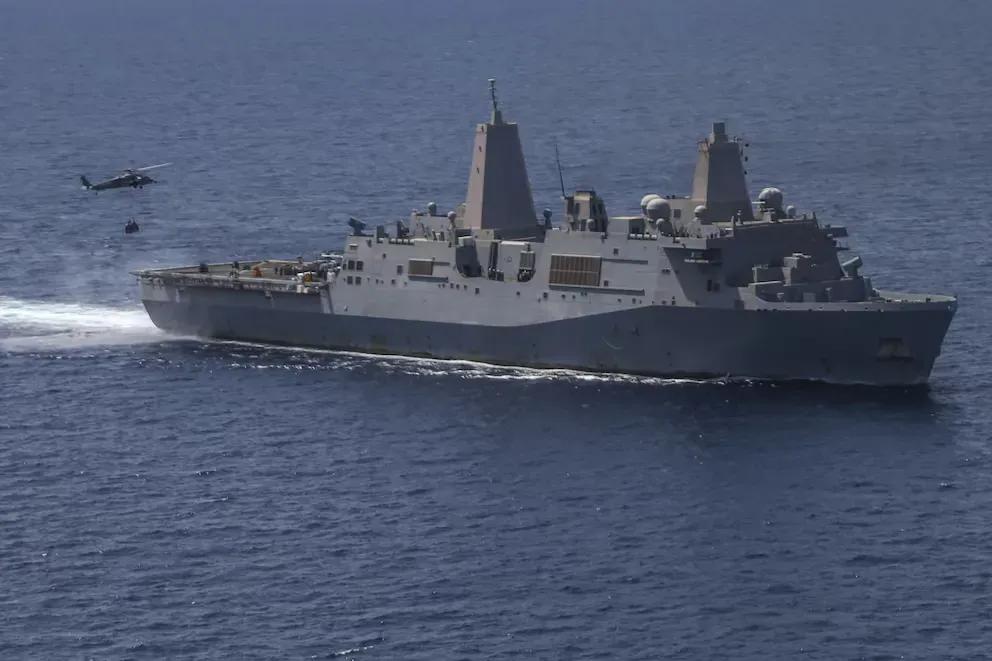The United States deployed an amphibious squadron off the coast of Venezuela to confront the threats from drug cartels (EUROPA PRESS/ARCHIVE)
International politics rarely offers scenes as theatrical as the current dispute between the United States and the regime of Nicolás Maduro. The White House, under Donald Trump's mandate, has decided to go beyond rhetoric: deploying three destroyers off the Caribbean coast, accusing Maduro of narcoterrorism, and offering 50 million dollars for information leading to his capture. These are not just gestures, but a strategic architecture whose explicit goal is to erode what little legitimacy remains in a regime that, in reality, does not govern but rather administers the inertia of a devastated country.
Maduro: a dictator masked as president
It is important to emphasize precisely: Maduro is not a legitimate president. The United States—along with a good part of the West—never recognized him as such. The elections that extended his term were fraudulent, and his “popular power” is a mirage sustained by the bayonets of a military-corporate elite and the repressive control of a state that functions as a cartel. It is almost grotesque that, in response to Trump's naval deployment, Maduro announced the mobilization of 4.5 million militiamen to “defend the homeland,” when the most reliable electoral turnout figures barely attribute him 3.3 million votes. Where do these paper armies come from? The political math of chavismo has long ceased to match reality.
The contrast is brutal: while Trump portrays him as the head of the “Sons of the Sun Cartel,” a narco-state sheltered in Bolivarian rhetoric, Maduro tries to cloak himself with the aura of a popular commander willing to resist “imperial provocation.” The first has legal backing, the second barely has a propaganda foundation.
Trump's strategy: ships and rewards
Trump knows that the word “dictator” loses its edge if repeated excessively. That’s why he turned it around: it’s not enough to accuse Maduro of authoritarianism; he must be accused of narcoterrorism. In doing so, he removes him from the political arena and places him in the territory of organized crime. This justifies before his own electorate and the hemisphere a policy of harassment that doesn’t need classical intervention to be effective.
The deployment of three naval destroyers in the Caribbean is a calculated gesture: too strong to be ignored, too restrained to constitute an invasion. Washington resorts here to a strategy of “amphibious coercion”: showing military muscle as a warning, conditioning the chavista leadership, and, in passing, sending a message to Moscow, Havana, and Tehran.
The response from Caracas: militias and rhetoric
Under pressure, Maduro rehearses his classic repertoire: denunciation of “imperialist provocation,” threats of mass mobilization, and an inflamed discourse of resistance. However, his own narrative betrays him. Proclaiming the existence of millions of militiamen ready to fight sounds more like theater than strategy. It’s hard to imagine a crumbling state apparatus, incapable of guaranteeing electricity and water in Caracas, organizing effective defense against American naval power.
Maduro's true defense isn't his militias but the network of international complicities that sustain him. Russia, with Vladimir Putin at the helm, emerges as an essential ally, offering diplomatic, military, and financial support. It’s no coincidence that every American move in the Caribbean generates immediate echoes in the Kremlin. Venezuela is, for Moscow, a symbolic resistance piece against American hegemony in the hemisphere.
Improbable invasion, permanent siege
The hypothesis of a large-scale American invasion is, for now, improbable. It would be costly, risky, and politically draining. But this improbability doesn’t mean tranquility: what Maduro faces is a form of permanent siege, where the destroyers at sea, the million-dollar reward, and the psychological warfare of American intelligence undermine the stability of the regime day by day.
What Trump understood—and what deeply unsettles Maduro—is that it’s not necessary to occupy Caracas to put him on the ropes. It’s enough to erode his legitimacy, isolate him internationally, sow doubts within his military circle, and remind all potential traitors that their boss has a price in dollars.
The war of legitimacies
The initial question—does the United States invade Venezuela?—must be reformulated. There are no marines marching towards Miraflores, but there is an invasion of another kind: an invasion of legitimacy. Trump redefines Maduro as a narcoterrorist, the Justice Department turns him into a fugitive, the naval fleet encircles him in a symbolic siege, and the Venezuelan people themselves reduce him to a dictator who only sustains himself with cardboard votes and prop militias.
Ultimately, the battle is not fought on the beaches of the Caribbean, but in the slippery terrain of international narrative. And there, Maduro is already losing. The real question isn’t whether the United States will invade Venezuela, but how much longer a dictator can stand when even his allies know that his fate is mortgaged.

Comments